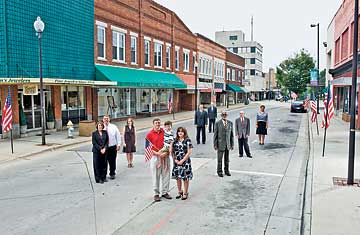
When Brian Whitfield, center, lost his job, it affected not just wife Debbie and son Logan but also some fellow citizens.
The Eaton Manufacturing plant in Roxboro, N.C., makes a 3-in. gadget called a lash adjuster that keeps pressure constant on engine valves, increasing fuel efficiency. Last year Brian Whitfield, a supply-chain analyst at the factory, had plenty of work scheduling orders for raw materials, components and packaging. But with the collapse of GM and Chrysler, business ground to a halt, and when Whitfield arrived at his cubicle on Jan. 20, he found an e-mail from management announcing layoffs. He looked around and saw people leaving, carrying boxes. Then his boss called him into the conference room. "Basically it was, 'Sorry, we're going to have to let you go due to sales,'" says Whitfield, 40. He returned to his cubicle with a packet of information about his severance benefits. He dropped it on his desk. He stared at his computer for a few minutes. "Then I just got up and left," he says.
The first week of unemployment was hard to take. Fortunately, Whitfield has a wife, Debbie, who earns $39,000 a year as an accountant for the local county government. The couple didn't have to worry about losing their cozy, well-kept home or being able to take care of their 4-year-old son Logan. After Brian's eight-week severance ran out, he started collecting unemployment insurance and the Whitfields began reining in spending to cover what they expect will be a 40% drop in income this year.
Though it has been painful for him, Whitfield's lost job should have had little effect beyond his immediate family. One lost job is a microscopic event in the massive organism of the U.S. economy. In good times, America sheds 2.5 million jobs a month but creates nearly 3 million new ones. Rolling unemployment allows businesses to adjust to demand, improving efficiency and fueling growth. A healthy economy compensates job losers by creating new jobs for them. America's economic athleticism has been the envy of other countries, a key to its success.
But the sharp shock of the 2008 financial crisis paralyzed the U.S. economy. Mass layoffs have been at a record high, flooding the labor market with job hunters. Six years of manufacturing-job losses were compressed into 18 months, overwhelming retraining programs. The collapse of home values and the tightening of credit make worker mobility a moot issue. Instead of connecting the jobless to new jobs, the employment system has seized up. After 33 weeks of searching for work, Whitfield is looking warily to December, when his unemployment insurance ends.
In an unhealthy economy, a single lost job becomes infectious, combining with others and spreading through family, neighborhood and community. Widespread cutbacks in spending by families mean lower demand for businesses and lower tax revenues for the government. This belt-tightening means fewer car sales and thus fewer jobs for car-part makers. It means less government spending on infrastructure and other public services, including economic development. The sum effect is less available work for job seekers — a perfect vicious circle. For a well-educated job loser like Whitfield, it can mean a permanent drop in earning power and standard of living — a reversal of the American Dream.
